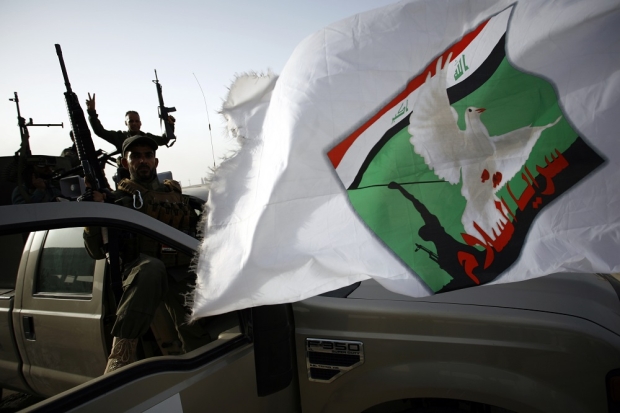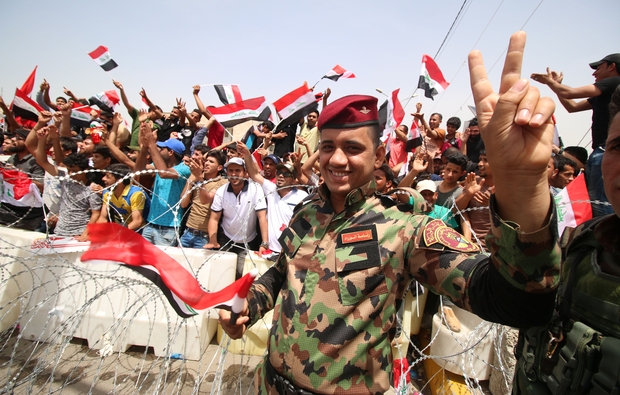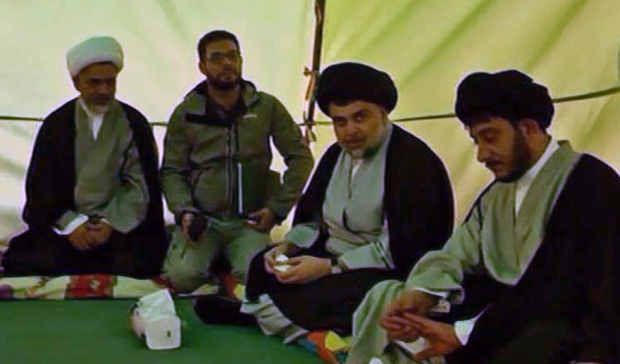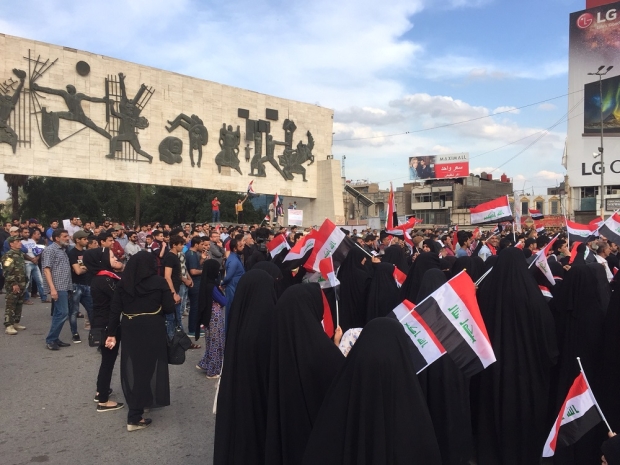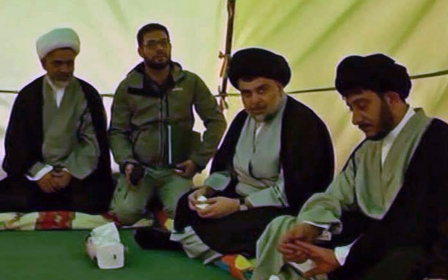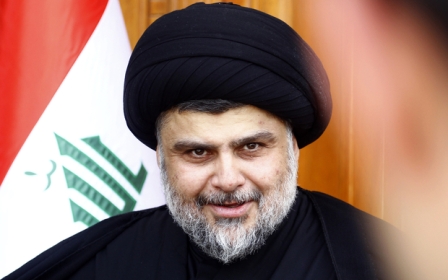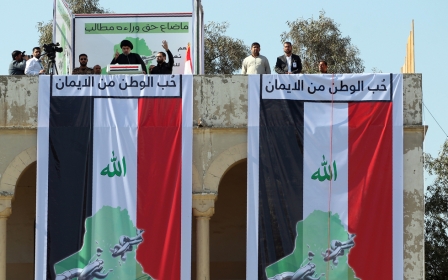EXCLUSIVE: Sectarian militias have no place in Iraq, says Muqtada al-Sadr
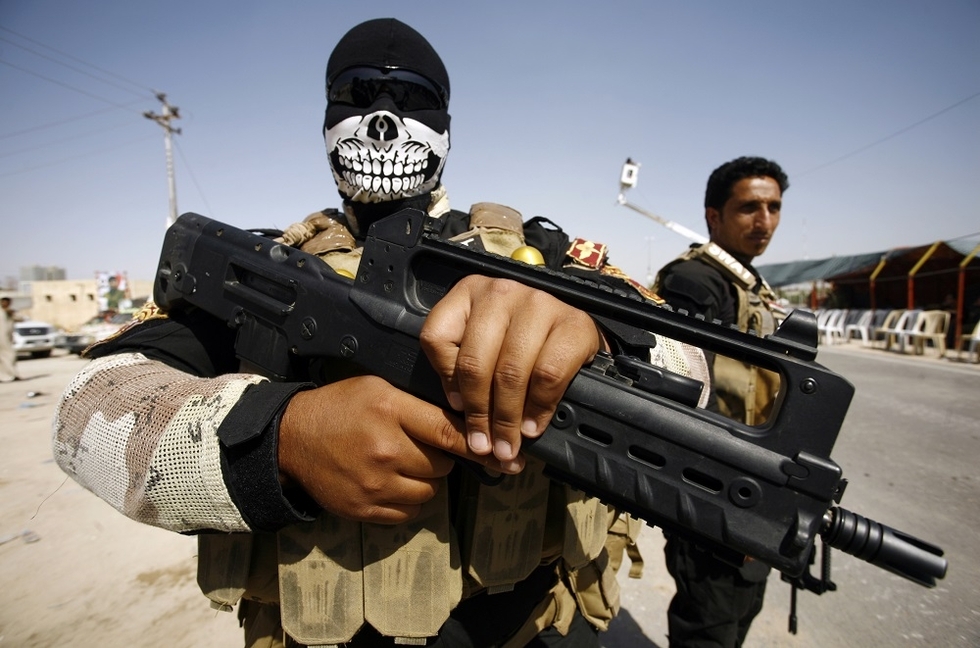
Muqtada al-Sadr, once dubbed "the radical firebrand cleric" in every Western media article that mentioned him, presents himself today, at the age of 43, as a promoter of sectarian tolerance and Iraqi national reconciliation.
I am very proud of Iraq's diversity but my fear is that we may see a genocide of some ethnic or sectarian groups
- Muqtada al-Sadr
In his first interview with a foreign journalist for three years, the man who created a Shia militia which fought the Americans and the British for several years of their occupation, told Middle East Eye that he wants all militias, including his own, to be disbanded.
He also said he favours urgent dialogue with Iraq's Sunni politicians so as to prevent clashes between Sunni and Shia, as well as Arabs and Kurds, once the country no longer has an enemy to unite against.
"I'm afraid that the defeat of Daesh [Islamic State] is only the start of a new phase. My proposal is inspired by fear of sectarian and ethnic conflict after Mosul's liberation," he said.
"I want to avoid this. I am very proud of Iraq's diversity but my fear is that we may see a genocide of some ethnic or sectarian groups."
The interview took place in the upper floor of Sadr's two-storey home in Najaf, a pilgrimage city which houses the shrine of Imam Ali, sacred to Shias around the world.
The reception room was small and almost intimate by the lavish standards of most Iraqi VIPs' audience chambers. While some like to keep their guests waiting, Sadr was already in a chair when MEE was ushered in.
He listened to questions intently, smiling frequently, including during one surprise diversion when, unprompted, he suddenly said: "I'm very happy to see Britain leaving the European Union."
Asked why, he said the EU echoed US foreign policy. When I said that Britain also did on many issues, he replied with another smile: "I will bless you if you separate from the United States."
During 2005 and 2006 Sadr's self-styled Mahdi army was involved in the sectarian killings which engulfed Baghdad. Hundreds of Sunnis were murdered by militias loyal to various Shia leaders. Hundreds of Shias were murdered in return.
The transformation from those days to Sadr's current desire for reconciliation with Sunnis is remarkable. But the seeds were planted earlier. Sadr is reviving the stance he took in the first two years of the US-led occupation when he sent aid to the Sunni city of Fallujah after it came under attack from US marines in April 2004.
At the time Sadr's supporters carried banners saying: "Not Sunni, not Shia. We are all Iraqis."
Sadr is also following the line of his soft-spoken but passionately patriotic father, Grand Ayatollah Mohammad Sadeq al-Sadr, who was murdered by agents of Saddam Hussein in 1999.
Muqtada al-Sadr's overtures to Sunnis are having a positive effect. "He is the Shia who is closest to Sunnis. Of all the Shia leaders he is the most open to dialogue," Mahmoud Mashhadani, a former speaker of the Iraqi parliament, told MEE. For the last decade the job has always been held by a Sunni.
Many ordinary Sunnis echo Mashhadani's view. A Sunni translator in Baghdad, who did not want to give his name, recounted three cases in the last three years where Sunnis whom he knew had come under threat from Shia militias. They turned to Sadr's militia who intervened and prevented further abuse.
Sadr had put his Mahdi army on ice in 2007, keeping it in reserve for future use. When IS seized Mosul in June 2014, he brought it back under the new name Saraya al-Salam [Peace Brigades].
Some 40,000 volunteers from the brigade are deployed north of Baghdad, mainly defending an important Shia shrine in Samarra. They are not engaged in the campaign to regain Mosul.
Mobilising for the future
As Iraqis begin to discuss the country's post-Mosul future, the role of the various militias is a top priority. A particular problem is the Hashd al-Shaabi (Popular Mobilisation Units or PMU) which pledge allegiance to rival Shia politicians and have been accused of atrocities against Sunni civilians in cities liberated from IS.
Parliament passed a law in November to integrate the PMUs into the Iraqi army but it is not yet decided whether they will go in as individual soldiers or as whole units. If it is the latter, they could act independently again.
Sadr expressed concern in his MEE interview. "It's difficult. Saraya al-Salam will be disbanded. But there's a law that has been made for Hashd al-Shaabi so I can see that Iraq will be under the control of militia groups," he said.
"Accordingly we need a strong attitude from the government [to resist this]. Security should be exclusively under the Iraqi army."
He favours the disbanding of the PMUs but is not against individual members transferring to the army.
With IS on the run, some PMU leaders advocate Iraq forces going into Syria to finish them off in their capital, Raqqa. There is even talk of sending Shia militias to Yemen to help the Houthis resist Saudi forces.
Sadr opposes this, as well as a recent decision by Iraq to use its US-trained airforce against IS targets in Syria.
"Conflict in Syria may increase," he said. "We can see this from Abadi's decision to conduct air strikes in Syria. Many Hashd al-Shaabi leaders have talked of wanting to intervene in Syria and Yemen.
"I'm afraid conflicts may spill over into Iraq from neighbouring countries. My view is that we should not intervene in others' affairs just as others should not intervene in ours. We want to save our blood. Enough has been wasted already."
Sadr's fears about an Iraqi intervention in Syria arise in part from recent statements by Abu Mohandis, a PMU leader who is close to Iran. He called for the PMUs to cross into Syria to pursue IS. Iraq's former prime minister, Nouri al-Maliki, is also reported to favour this.
Future solutions
Sadr's proposals for Iraq's political future after Mosul is liberated were first elaborated in November in a 29-point document, called Initial Solutions.
Apart from obvious humanitarian issues, like helping internally displaced people to go home and have electricity and other public services resumed, the document suggests tribal delegations from the largely Shia south and the centre of Iraq should be sent to the mainly Sunni liberated areas and vice versa, so as to work on eliminating sectarian tensions.
It advocates a UN fund for reconstruction and a UN-supported commission to monitor human rights and the protection of minorities. There should be a mechanism to investigate war crimes.
It says "an honest Iraqi judge" should be appointed to investigate people suspected of having collaborated with IS, but "making sure not to count geographically based bias or misinformation from secret informants".
This is designed to avoid score-settling or the assumption that every Sunni supported IS in the huge areas of Iraq which the group controlled.
It suggests turning the headquarters of Saraya al-Salam and the PMU into educational and cultural centres.
As for the future of foreign troops, Sadr's document says the government "must request all invading and friendly forces to leave Iraq".
Sadr has different views on Iranian and American motives for being in Iraq, but he wants Iranian revolutionary guards and advisers to go just as much as he wants American troops to leave.
The prime minister, Haider al-Abadi, has said he wants a reduction in the current contingent of 5,000 US troops, but needs US trainers to remain.
In his MEE interview, Sadr rejected this. "I refuse every aspect of the US army in Iraq," he said. He also declines to meet any US government official or British officials because "they represent the views of the US".
While reaching out to Sunni politicians, Sadr has recently developed a surprisingly close working relationship with secular leaders from Iraq's left-wing and progressive parties.
It began in 2015 after the secular movements started weekly protests against corruption and for reform and social justice in Baghdad's Tahrir Square.
Raid Fahmi, the general secretary of the Iraqi Communist party, told MEE Sadrists asked to join the protests but conditions were set.
"Only national slogans, no pictures of personalities, and non-violence," he told MEE. "We are calling for a civic state, electoral reform and moves against corruption. We talk of a civic state and a civic movement, rather than secular ones, because in Iraq secular sounds atheist or anti-religious."
Fahmi took encouragement from another dramatic step in Sadr's political evolution.
Iraqi Shia leaders do not advocate turning Iraq into a religious state, as Iran's Shias have done, but they always used to be vague about their preferred model for the country. "In 2015 Sadr started calling for a civic state," Fahmi said.
The civic movements hope that parties in Iraq will eventually abandon politics based on identity and adopt ones based on programmes and policies. There could then be "trans-confessional" co-operation in parliament and even coalitions to contest elections together.
Fahmi noted that even Ammar al-Hakim, head of the sectarian Shia party, the Islamic Supreme Council, sent a message of greeting to the recent Communist Party congress, whereas his father, an ayatollah, had issued a fatwa against communism some years ago.
There is a long way to go in establishing trust. On both sides there are discussions and doubts about the wisdom of co-operation, Fahmi said.
Some people in the civic movement were concerned that developments in Iraq could echo what happened in the Iranian revolution of 1979 where the new religious leadership first worked with secular parties before turning brutally against them.
For their part, Fahmi said, some people in the Sadrist movement worried that the unity of the Shia community, the so-called Beit Shii [Shia House] would be weakened. They feared Sadr was moving too fast.
MEE observed the two movement's slightly nervous collaboration at the regular protest meeting in Tahrir square last Friday.
Streets were cordoned off with razor wire and scores of police were diverting traffic. Young Sadrist marshals on the stage wore caps with the national Iraq emblem.
Others ran the body checks on everyone coming into the square to prevent suicide bombers from infiltrating. Women in black abayas (long cloaks) huddled in a group at the front of the crowd of some 3,000, waving Iraqi flags.
The civic democrats tended to stand separately. Several carried the same banner, saying "Yes for a Civic State and Democracy. No to the system of sharing the spoils of power."
There were shouts of: "Thieves, thieves. They [the current political leadership] have stolen your money, people."
The speakers at the microphone came from both movements. There was also a Shia tribal leader in traditional headdress and robes.
Saraya al-Salam was formed to protect shrines. Once security is re-established, there will be no need
- Ahmed Abu Warith, Sadr supporter
"I've been coming here every Friday for two years," said Ahmed Abu Warith, a clerk in a government office.
"I'm honoured to be a Sadrist. The Mahdi army was formed to fight the occupation. Saraya al-Salam was formed to protect the shrines. Once security is re-established, there will be no need for it."
Louay Salman, a shopkeeper, said: "I come most Fridays to protest against corruption. We have so much natural wealth in Iraq yet our neighbours live better.
"We have strong religious currents in society but strong civic ones too. We're working side by side."
Then he added with a half-smile: "Ten years ago I would never have imagined I would be protesting alongside Sadrists. People evolve all the time."
New MEE newsletter: Jerusalem Dispatch
Sign up to get the latest insights and analysis on Israel-Palestine, alongside Turkey Unpacked and other MEE newsletters
Middle East Eye delivers independent and unrivalled coverage and analysis of the Middle East, North Africa and beyond. To learn more about republishing this content and the associated fees, please fill out this form. More about MEE can be found here.


